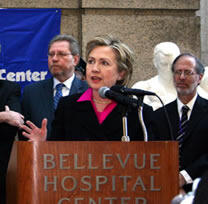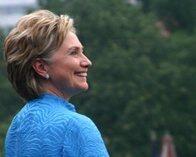Congress: 13% Good/ Excellent, 43% Poor
Just 13% of Likely Voters now say Congress is doing a good or excellent job. The latest Rasmussen Reports national telephone survey found that 43% give Congress a poor rating.

Just 13% of Likely Voters now say Congress is doing a good or excellent job. The latest Rasmussen Reports national telephone survey found that 43% give Congress a poor rating.

Half of voters (50%) believe America’s best days have already come and gone. The latest Rasmussen Reports national telephone survey found that= 33% say the nation’s best days are still in the future while 18% are not sure.

The Clintons are trying to steal the nomination from Barack Obama - and he can't let them.

No matter which Democrat wins their Party’s Presidential nomination, John McCain will enter the fall campaign with a substantial advantage on the issue of National Security.

WASHINGTON -- The congressional Republican establishment's charade, pretending to crack down on spending earmarks while actually preserving their uncontrolled addiction to pork, faces embarrassment this week when the Democratic-designed budget is brought to the Senate floor.

An early look at North Carolina’s Democratic Presidential Primary shows Barack Obama with a seven-point advantage over Hillary Clinton. The latest Rasmussen Reports telephone survey finds that Obama attracts 47% of the vote while Clinton earns 40%.

Rasmussen Markets data on Sunday morning shows that Hillary Clinton is expected to win upcoming contests in Pennsylvania, West Virginia, and Kentucky. The former First Lady is very slightly favored in Indiana. Obama is expected to win in Mississippi, North Carolina, Oregon, and Montana.

Barack Obama won 11 out of 11 primaries and caucuses from Super Tuesday to Feb. 19. Hillary Clinton won three out of four contests on March 4.

In the craziness of the race for the Democratic Presidential Nomination, it Is possible that one candidate might finish the Primary Season with the most pledged delegates while another could end up with the most popular votes.

While most of the political world is focused on the Pennsylvania Primary scheduled for April 22 or the Democrats’ delegate dilemma, Mississippi is hosting a Primary of its own this coming Tuesday.

Conservatives and party regulars were not happy about the selection of Carly Fiorina to head the Republican National Committee's "Victory 2008" campaign raising funds for the presidential election.

Only 19% of American Voters believe the United States is better off today than it was four years ago. A Rasmussen Reports national telephone survey found that 67% disagree.

If Democrats hold a second Presidential Primary in Michigan, the race could be one of the most competitive all year.

If Florida decides to have a second Presidential Primary this year, Hillary Clinton will begin the race with a sixteen-percentage point lead over Barack Obama. The latest Rasmussen Reports telephone survey shows that Clinton attracts 55% of the Sunshine State Primary Vote while Obama earns 39%.

The latest Rasmussen Reports telephone survey of South Dakota voters finds Democratic Senator Tim Johnson enjoying substantial leads over two potential Republican candidates in the race for the United States Senate.

A recent Rasmussen Reports telephone survey of Likely South Dakota voters found Senator John McCain with strong leads over both potential Democratic candidates in the election for president.

Before Hillary Clinton was declared the winner in Texas, most American voters had read, seen, or heard about her 3:00 a.m. telephone commercial.

So now what? The Republicans have their nominee -- and the Democrats have a marathon that it's not clear can be won, at least not on conventional terms.

Sixty-three percent (63%) of Florida Democrats favor a “do-over” Presidential Primary in their state. The latest Rasmussen Reports telephone survey finds that 28% of Democrats are opposed.

Daylight Savings Time takes place on Sunday at 2 a.m. A recent Rasmussen Reports survey of 1,000 adults found most (54%) adults were correctly able to identify that the time change occurs on March 9. Thirty-one percent (31%) weren’t sure when they needed to change their clocks.